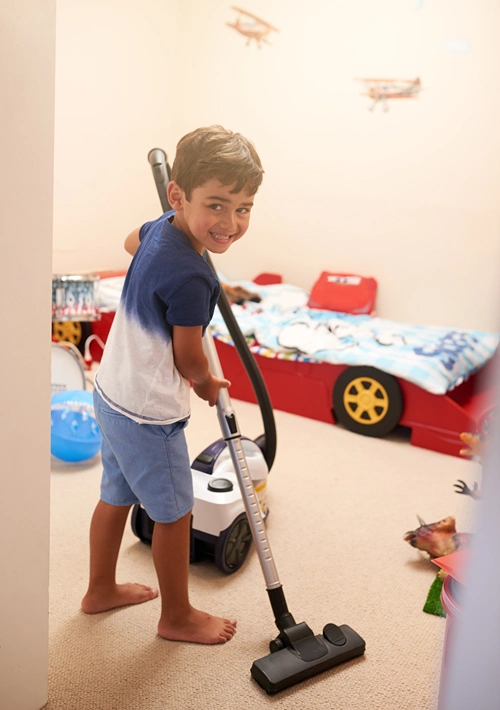How to Get Your Kids to Do Chores
If you remember doing chores as a child, you likely recall arguing with your parents about getting them done. Cleaning your room and doing laundry are not fun for most kids, but they are important ways to teach them responsibility. As a busy parent, having your kids do chores can also be a weight off your shoulders.
How do you get your kids to do chores when they’d rather play? These tips can make it simpler. They build chores into a child’s routine, making them a habit, meaning you’ll encounter less fuss when asking your kid to do something.
Start Early
Younger children are on a quest for knowledge and haven’t formulated decisions on what is pleasant or unpleasant in life. At three years old, your kid will likely be willing and ready to help with anything you ask them to do, especially if you take the time to show them how. Take advantage of this time to instill responsibility and independence into their routines.
Start out with easy tasks that your toddler can handle. For example, they can put placemats on the dining room table or pick up their toys in the living room.
With a few gentle reminders about their obligations initially, your children will soon start building these small responsibilities into their daily routines. When they do unprompted chores, your positive recognition of their actions will encourage them further.
Don’t initially overload your young kid with responsibility. Introduce them to new chores as they master their current ones and grow into helping.
Try Behavior Charts
Visual congratulations like behavior charts further encourage chore completion as your kid ages. Even as a parent, receiving a complimentary post on a business bulletin board or an email of recognition from a manager motivates you and provides a sense of accomplishment — a chore chart acknowledging your child’s efforts has the same effect.
Say your child has three daily chores during the week. They could end the cycle with 15 gold stars on the chart if they complete them all perfectly. You could allocate “star content” rewards after every weekly cycle. Fifteen stars might earn your kid their toy choice up to a particular value, while 14 stars could mean their choice of a favorite cereal.
You can also make a monthly chore schedule to account for bigger tasks. On a daily basis, tasks may look like making the bed, putting toys away and loading the dishwasher. Things like changing their bedsheets or vacuuming their room can be done once a week, while helping to clean the bathroom may be once a month.
Always Reward Appropriately
Suppose you only start assigning chores when your child is older. At school-going ages, your kid already has built their daily routine and has less time to do what they enjoy when they get home. With homework and bath times factoring into their afternoons and early evenings, you may encounter more resistance to assigning them chores.
Offering small rewards, like replacing the Friday chores with a playdate or additional screen time, goes a long way to keeping the peace and satisfying your kid. Otherwise, introducing a fun activity on certain weekends may encourage unhindered chore completion among older children during the week.
As your child reaches teenage status, finances become essential in maintaining their fledgling social lives. If your teenager already does chores, replace their physical or time-based rewards with an allowance to likely find favor with your youth. If you only introduce chores very late, the same financial incentive will motivate your offspring to work with you.
If your kids do tasks for their allowance, they’ll value the money they get more than if you dish it out to them for nothing. Chore completion for remuneration provides an essential life lesson to a teenager — in time, they’ll move from home and have to earn to survive and thrive. Emphasize this point when explaining the importance of “working” for their allowance.
Dealing With Incompleted or Ignored Chores
The unfavorable side of allocating chores is when they are incomplete or left entirely undone. How should you deal with these?
With young kids, failing to reach a chore target on their star chart means no reward at the end of a cycle. You might feel guilty when this happens but remember that your parental responsibility lies in teaching your kid there’s a consequence to their actions.
For your adolescent, their allowance is a vital part of their growth. Perhaps, instead of removing a portion of the allowance — which might foster resentment — consider taking away or reducing privileges like screen time or enforcing an earlier bedtime.
Chores Benefit Your Child
Assign chores to your child. This proactive habit will teach them valuable life lessons and prepare them for adulthood when working for something results in greater rewards.
 Author bio: Cora Gold is the Editor-in-Chief of women’s lifestyle magazine, Revivalist. She strives to live a happy and healthy life with her family by her side.
Author bio: Cora Gold is the Editor-in-Chief of women’s lifestyle magazine, Revivalist. She strives to live a happy and healthy life with her family by her side.
Follow Cora on Facebook and LinkedIn.




